Title: Mayors: We’re More Accountable Than Congress, State Government
District of Columbia Mayor Muriel Bowser and three other heads of cities spoke at Georgetown yesterday at a McCourt School of Public Policy event on “Building Cities of Opportunity for All: Policy Solutions for Equitable Economic Development.”
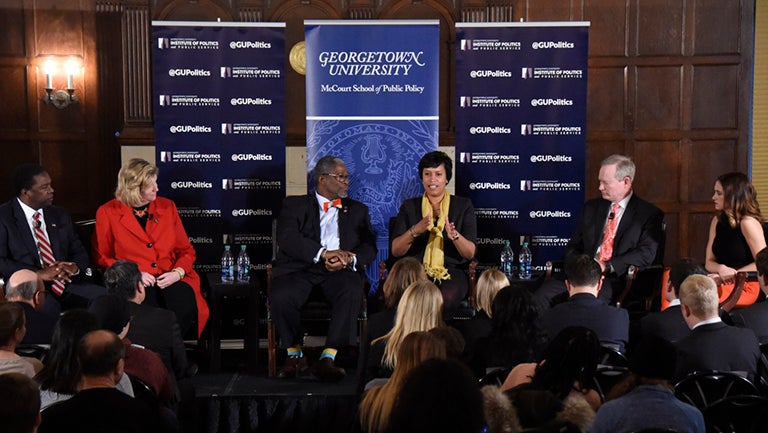
–Mayors have to be more accountable to their constituents and have far more opportunities to make a difference than those serving the federal or state systems, the heads of four cities said yesterday at a McCourt School of Public Policy and Institute of Politics and Public Service event.
“I think that there is value in going to Washington, D.C., and working in federal government … it really depends on what you want to do,” said Sly James, mayor of Kansas City, Missouri. “If you want to … get engaged in long-term conversations about how many pages there really are in the Patriot Act and whether or not Obamacare should, for the ninety-ninth time should be overturned, then go to D.C. and work in Congress.”
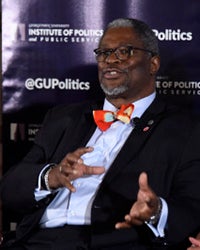
He said added that state legislatures are equally contentious and partisan, and joked that if students wanted to work in Congress they could look forward to learning how to “knuckle-point” and getting their hair in styles that don’t move.
Real Conversations
“But if you want to have real conversations with your neighbors about ‘my trash isn’t being picked up,’ ‘my streets need repair,’ ‘my kids’ schools are not working they way I want them to,’ ‘there’s too much violence in the street,’ ‘how are we spending our money,’ ‘what this development means for me,’ ‘how are we going to erase poverty,’ then the local level is the place to be,’ he said.
James joined Washington, D.C., Mayor Muriel Bowser, Oklahoma City Mayor Mick Cornett and Dayton, Ohio Mayor Nan Whaley at the event yesterday. Alvin Brown, former mayor of Jacksonville, Florida, and a Spring Fellow at McCourt School’s Institute of Politics and Public Service (GU Politics), moderated the discussion, along with a McCourt student Erin Mullally (G’17).
Practical Implications
The mayors were in town for the U.S. Conference of Mayors, which began yesterday and runs through Friday. Tom Cochran, executive director of the conference, spoke briefly before the panel convened.
“We exist to have conversations like this one,” said Mo Elleithee, executive director of GU Politics, “where we are talking about the practical implications of policy, and pulling back the curtain and talking with the people who actually do it about the how and the why and how it’s actually done.”
Elleithee said McCourt School students suggested the event, called “Building Cities of Opportunity for All: Policy Solutions for Equitable Economic Development.”
Attacking Inequality
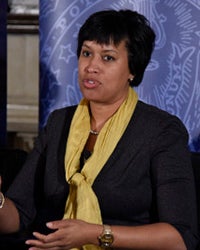
“Mayors have to do things,” Bowser said during the event, “because we don’t have the ability to push it off on anybody else. The residents are counting on us for public safety, for investments in affordable housing, for schools that work, to pick up the trash…”
She said her city was attacking the problem of inequality by investing $100 million a year in affordable housing, creating more youth employment opportunities, a 15-year, multimillion-dollar effort to end homelessness, and creating jobs for both skilled and unskilled workers.
Cornett said that in his state, homelessness and mental health problems were solved through philanthropic and faith-based efforts.
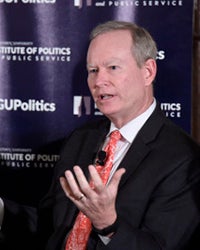
“One of the reasons that the model seems to have worked well for us is that these are all services that traditionally government doesn’t excel at addressing,” he said. “And when you’re talking to a person who has that intersection of homelessness, poverty and mental illness, that person most likely needs an individual solution. Government isn’t good at individual solutions.”
But he also said the model in his state may not work in others.
Pre-K Education
More than one of the mayors talked about the importance of early childhood education in creating equal opportunities for people in their cities.
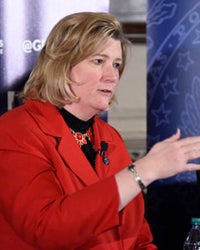
“I think that policies that are universal are really key to the shared prosperity model,” Whaley said. “If you just say, ‘we want to do something for poor kids,’ it’s not as valued as if you do it across the whole spectrum. Because everybody wins when they get to go to pre-K regardless of income.”
Oklahoma has universal pre-K education that has been extensively studied by Georgetown public policy professor William Gormley and other researchers at the university’s Center for Research on Children in the United States, finding that children in pre-K outperform those who aren’t in the system.
Closing the Gap
In Kansas City, James noted that the schools with the most children of color struggled the most. He said the root problem is that the children aren’t ready for kindergarten and that children raised in poverty hear 30 million fewer words than other children by the time they are 3 years old.
“So we have to cure that gap in order to have a fighting chance in kindergarten,” he said.
Changing People’s Lives
In addition to the McCourt School and GU Politics, the school’s Public Policy Student Association, its Policy Innovation Lab and its Baker Center for Leadership & Governance sponsored the event.
The Georgetown Public Policy Review, the McCourt School’s policy journal, served as the sixth sponsor.
“You can work for a Congressman, you can work for a governor, “ Cochran said. “But when you’re working with a mayor, you’re changing people’s lives.”